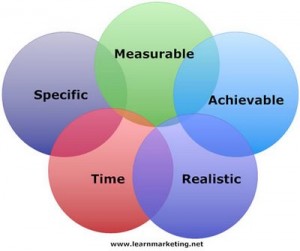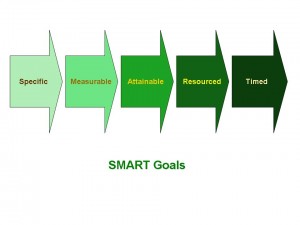It is approaching 2012, and (hopefully) most of us are finalizing our plans for the upcoming year. In our groups of The Alternative Board, we are asking each member to state their sales and revenue objectives.
We all know that goals are supposed to be SMART, the acronym for setting a goal that is well…smart. When I ask an owner whether he or  she sets SMART goals, they usually reply “Oh sure. That’s Specific, Measurable, and uh…uh…”
she sets SMART goals, they usually reply “Oh sure. That’s Specific, Measurable, and uh…uh…”
Not knowing the acronym past the first two words isn’t all that surprising. Many goals really address only the first 2 points. “We will increase revenues by 10% in the coming year.” That is both specific and measurable. Unfortunately, it doesn’t say anything about how those revenues are supposed to be generated. Is it coming from price increases? Does it include new stores or new lines, or it is an increase of legacy business? Who is responsible for the increase?
The most popular definition of SMART when Googled is Specific,  Measurable, Attainable, Realistic and Timely. I have always had an issue with that. In practical terms, how could something be attainable and unrealistic? Or could it be realistic, but unattainable? Using 40% of an acronym to say the same thing twice makes it pretty dumb, in my opinion.
Measurable, Attainable, Realistic and Timely. I have always had an issue with that. In practical terms, how could something be attainable and unrealistic? Or could it be realistic, but unattainable? Using 40% of an acronym to say the same thing twice makes it pretty dumb, in my opinion.
There are several widespread variants. One swaps “attainable” for “accountable.” That is clearly better. Anyone who has managed a team understands that you can’t expect an objective to be accomplished unless someone is given responsibility for doing it.
There is an adage in management that says “If you say anybody can do it, everybody will know that somebody will do it, so nobody will do it.”
Another variant of SMART trades out “realistic” for “relevant.” That addresses the redundancy issue, but I’m not sure why we need “relevant” as a critical point in formulating a goal. Is that because so  many people go through the planning process to develop irrelevant goals? What would they look like? “As the largest widget maker in our market, we will become known for having the nicest employee lunch room?”
many people go through the planning process to develop irrelevant goals? What would they look like? “As the largest widget maker in our market, we will become known for having the nicest employee lunch room?”
One definition uses “results-focused.” Besides the problem with loading any acronym with hyphenated words, it also seems redundant. SMART is supposed to be how you make goals results-focused. Saying we will make a results focused goal by using a mnemonic that says it should be results-focused seems just a bit obvious.
Most folks get the last one, or at least some of the approximations of it. “Timely” is easy to remember, but grammatically vague. Does it refer to a goal that is being set at the right time? A goal that recognizes market or industry conditions as favorable? “Time-bound,” Time-sensitive,” and “Time-framed” are all common variants. They all are somewhat stretched to mean basically the same thing, which is “deadline;” but SMARD just doesn’t have the same ring to it. We will leave the time reminders alone. Pick the one you like. I’m using “Timed,” since it encompasses the idea of a schedule, not just a deadline (and it isn’t hyphenated).
So we can generally accept three of the five. The fact that people remember them, and they are generally consistent, indicates that they are worthwhile. It is the middle ones, the A and the R, that people forget, or keep changing in attempt to improve on the acronym.
Here is my change. Keep the “A” as attainable. Every good goal conversation should engender a discussion about whether we can do it or not. That follows specificity and measurability. It then leads to the discussion of “How?”
The “how” part of the acronym is Resourced. No goal makes sense unless you are committing human and physical assets to it. Resourcing a goal requires that you assign responsibility, allocate budget dollars, and tell those accountable for it what its priority is in their work plan.
So when the sales department is given a goal of 10% increase in revenue, Resourcing builds in the process of “how?” Do they get to hire more reps? Does marketing buy more advertising? Does the incentive plan change? Is purchasing bringing on a new product line? Once you determine “how,” then you can progress to “when.”
So my definition of SMART is:
Specific: What exactly do we want to accomplish?
Measurable: How will we know that we accomplished it successfully?
Attainable: Is this within our capabilities?
Resourced: What human, financial and other assets will we apply to this objective?
Timed: When is this going to happen?
 This SMART follows a logic process, avoids duplication, and should be more easily remembered.
This SMART follows a logic process, avoids duplication, and should be more easily remembered.
